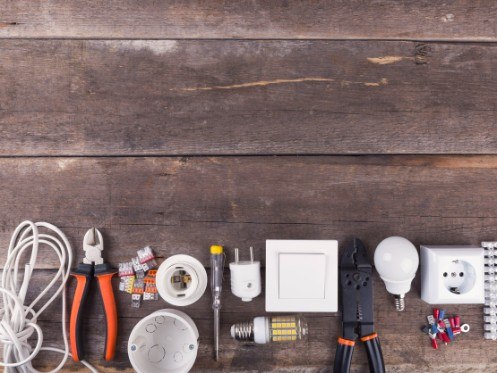Slab leaks are among the most unwelcome plumbing problems that can occur within the home. A slab is another name for a type of concrete foundation that supports the structure of a house. Due to their design, household water and sewer lines often run just beneath this slab. A slab leak can occur if these plumbing lines break or deteriorate, thereby releasing moisture or water below the home’s foundation. As you can imagine, slab leaks are serious and cause significant damage if left uncorrected. Learn how to take action at the first sign of a slab leak to protect the value of your home.
What Is a Slab Leak?
A slab leak refers to a plumbing issue that happens when moisture seeps out of the water supply or drainage pipes located beneath concrete foundation of a home. Concrete slabs are common foundational elements of modern houses. Since concrete slabs conceal underground pipes and water lines, it is possible for a leak to remain undetected until it has caused enough damage to crack or fully compromise the foundation of the home. Even the slightest slab leaks can create extensive damage to flooring, walls, drywall, or other structural elements of the home.
How Common Are Slab Leaks?
Slab leaks are common due to the widespread use of concrete slab foundations for houses. During the post-World War II construction boom, concrete slabs became popular because they are sturdy, economical, and efficient. Builders could use concrete to produce consistent quality in a shorter amount of time. As these houses age, however, piping beneath the slabs can deteriorate and cause a leak.
Concrete slabs are also very common in newer homes. According to the National Association of Home Builders (NAHB), over 95% of new homes in the West South Central states and nearly 80% of new homes in the American South used concrete slabs in 2020. To create a slab foundation, builders pour between four to six inches of thick concrete directly on a prepared surface. Because plumbing lines run beneath the slab, only a professional can reach these pipes in the event of a leak.
What Causes Slab Leaks?
Several factors can cause slab leaks. Regardless of the cause, it is important to hire a professional plumber to correct the issue immediately. Some of the most common causes include pipe corrosion, abrasion, shifting soil, acidic water, or excessive pressure.
Soil Expansion or Contraction
Soil shift is one of the most notorious culprits for slab leaks. The soil beneath any home can shrink or swell depending on whether ground conditions are dry or wet. According to the American Society of Civil Engineers, around 25% of all U.S. homes experience extensive damage due to soil shift. The same organization reports that the cost of damage from soil expansion or contraction adds up to $2.3 billion per year in the United States alone. Soil that is high in clay or sand content are prone to both vertical and lateral shifting. The movement of soil beneath a foundation can damage water pipes, and this slow slab leak continues to put excess water into the ground. This chain reaction can eventually lead to substantial property damage.
Corrosion
Pipes located beneath your home’s concrete slab make contact with the soil and the metals within it. This exposure to soil and dissimilar metals can lead to corrosion. The term corrosion refers to the gradual weakening or destruction of plumbing from chemical reactions. Pipes that are in contact with very hard water are also vulnerable to corrosion. The reason is that water that is either too acidic or too alkaline can create a pH imbalance that destroys pipes.
Abrasion
Water flowing through pipes can cause vibration. If the pipes are close enough to concrete, rocks, gravel, tree roots, or other hard surfaces, this vibration can create enough friction to weaken the pipes over time. These weaknesses along the joints or exteriors of pipes will eventually result in leakage.
Excessive Pressure
The pipes beneath your home slab can also crack due to excessive pressure. Causes of excess pressure can range from heavy clay soil to seismic pressure from tremors or earthquakes. While most pipes can withstand some pressure, too much force on the total surface area of your pipes can take its toll and cause leakage.
Aging Home
In some cases, slab leaks are simply the result of an aging home. For example, cast-iron pipes were the standard for homes built prior to 1960. While these pipes are sturdy and fire-resistant, the high iron content means that they can corrode underground with time. Other homes built during the 20th century can also contain galvanized steel pipes. With time, these pipes are vulnerable to corrosion, rust, mineral buildup, or clogging. Aging pipes are more prone to cracking and can cause slab leaks, so it is important to contact a professional plumber to help address the issue.
What Are the Warning Signs of a Slab Leak?
Because the sources of slab leaks are usually located underground, only a professional plumber can accurately identify and diagnose a slab leak. However, there are several warning signs that may indicate leakage. It is important to contact a plumbing agency for leak treatment as soon as you encounter these issues.
Sudden Spike in Utility Bills
The first sign of a leak is an unexplained rise in your water bill. According to the Environmental Protection Agency (EPA), homes with water leaks can lose nearly 10,000 gallons of water a year. Moreover, up to 10% of homes have leaks that waste over 90 gallons of water each day. Slab leaks can cause water to escape from pipes and run through the meter, and the utility company will charge you for it. If your bill has suddenly skyrocketed even though your usage has not changed, contact a plumber to check for leakage.
Warm Spots on the Floor
Patches of warm spots or hot spots on the floor can also indicate slab leaks. When the hot water pipes leak, the heat can radiate from the concrete up to the surface of your floors. If you feel sudden hot spots that have nothing to do with an appliance or other heating source, reach out to a plumber to check the hot water lines.
Cracks in Walls or Foundation
Slab leaks can also cause cracks in the walls, baseboard, flooring, tiles, or foundation. As water from a slab leak accumulates, it can eventually weaken the soil beneath the slab. The result is an unstable foundation that causes other structural elements to warp or waver. Even hairline cracks can escalate into full-blown rupture, so it is important to contact a plumbing company if you see cracks along features of the home.
Mold or Mildew
Mold and mildew are common signs of a slab leak. A leaking slab can cause moisture to accumulate in patches and create the perfect breeding ground for fungus. Mold and mildew growth can occur beneath carpets, near walls, or around plumbing fixtures. In addition to discoloration and damage, mold growth can also cause foul odor. A plumber can help you tackle the source of excess moisture to prevent recurrent mold growth.
Raised or Warped Spaces on the Floor
Slab leaks can cause raised or warped flooring. The reason is the water pressure beneath a weakened slab can cause it to shift and rise. If you have wooden floor planks, this material can also absorb moisture from a leaking slap and twist or warp as a result. Contact a professional for inspection as soon as you noticed any raised “dome” shapes or loosened planks.
Sound of Running Water
If you hear running water sounds even if all faucets are turned off, it is often a sign of a leak in the water line. This whooshing water can indicate a small crack or hole in your pipes. Eventually, the excess water can cause a full slab leak.
What Should I Do If I Suspect a Slab Leak?
The first step after suspecting a slab leak is to contact a professional plumbing company for expert slab leak detection. Professionals have the right training and equipment to accurately locate the source of your leak. Even better, this detection and diagnosis usually does not involve breaking into your foundation. For example, modern plumbers often have non-invasive slab leak detection techniques such as thermal imaging or video pipe inspection. Sonic equipment devices like acoustic systems or ground mics can detect excess water vibration. While the average person does not own such equipment, a professional can use it to identify issues quickly. Your plumber can then recommend treatment options that may include pipe rerouting, relining, or trenchless slab repair.
What Are the Risks of Ignoring a Slab Leak?
Ignoring a slab leak can cause problems that take a toll on your property and checkbook. Even if you do not notice a spike in your water bill right away, slab leaks eventually cause other problems. For example, these leaks can cause extensive mold growth that create health implications for those who live in the home. The worst slab leaks can cause your home’s foundation to collapse. This can lower the resale value of your home and cost much more to repair than simply hiring a plumber to correct the source in the first place.
Contact Us Today
While slab leaks are among the most unpleasant surprises associated with home foundations, there are also viable ways to get help for this plumbing issue. Bobby L Greene Plumbing, Heating & Cooling Co. offers expert leak detection services for Shreveport, Bossier City, and the surrounding areas. In addition to leak detection and repair, we provide help with piping, repining, testing, and leak prevention. Contact Bobby L Greene Plumbing, Heating & Cooling Co. today to help ensure a sturdy foundation for your home.

